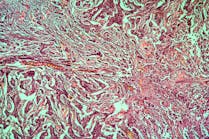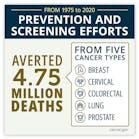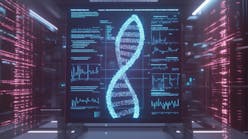The role of AI in early gastric cancer is more important than in advanced gastric cancer since early gastric cancer is not easily identified in clinical practice, according to a news release from the Journal of Medical Internet Research.
Artificial intelligence (AI) for gastric cancer diagnosis has been discussed in recent years.
Gastric cancer is the fifth most common cancer and the third leading cause of cancer deaths worldwide, contributing to 19.1 million disability-adjusted life years in 2017. Its primary risk factors are Helicobacter pylori infection and a family history of gastric cancer. Despite advancements in endoscopic, surgical, and systemic therapies, the global 5-year survival rate of those with gastric cancer remains low (25%-30%). Gastric cancer has an excellent prognosis at early stages, with a 5-year survival rate of approximately 95%, but it has a median survival rate of less than one year at advanced stages. Its favorable early prognosis is reflected in the lower mortality rates of gastric cancer in East Asia, which can be ascribed to the implementation of nationwide screening. This reinforces the importance of early diagnosis. However, gastrointestinal endoscopy, the standard detection method for early gastric cancer, has an unsatisfactory sensitivity of 70% and is operator dependent. Despite efforts to increase the detection rate, a valid screening method has yet to be developed. The recent advancement in artificial intelligence (AI) systems, which provides highly accurate and efficient image recognition, may indicate a solution to this problem.
The purpose of this study is to evaluate the diagnostic accuracy of AI in the diagnosis of early gastric cancer from endoscopic images.
Researchers conducted a systematic review from database inception to June 2020 of all studies assessing the performance of AI in the endoscopic diagnosis of early gastric cancer. The outcome of interest was the diagnostic accuracy (comprising sensitivity, specificity, and accuracy) of AI systems. Study quality was assessed on the basis of the revised Quality Assessment of Diagnostic Accuracy Studies. Meta-analysis was primarily based on a bivariate mixed-effects model. A summary receiver operating curve and a hierarchical summary receiver operating curve were constructed, and the area under the curve was computed.
12 retrospective case control studies in which AI identified early gastric cancer from endoscopic images were analyzed. The pooled sensitivity and specificity of AI for early gastric cancer diagnosis were 0.86 and 0.90, respectively. The area under the curve was 0.94. Sensitivity analysis of studies using support vector machines and narrow-band imaging demonstrated more consistent results.
AI may support the diagnosis of early gastric cancer. However, the collocation of imaging techniques and optimal algorithms remain unclear. Competing models of AI for the diagnosis of early gastric cancer are worthy of future investigation.
Citation:
Authors: Chen P, Lu Y, Kang Y, Chang C, The Accuracy of Artificial Intelligence in the Endoscopic Diagnosis of Early Gastric Cancer: Pooled Analysis Study, J Med Internet Res 2022;24(5):e27694, doi: 10.2196/27694,PMID: 35576561





